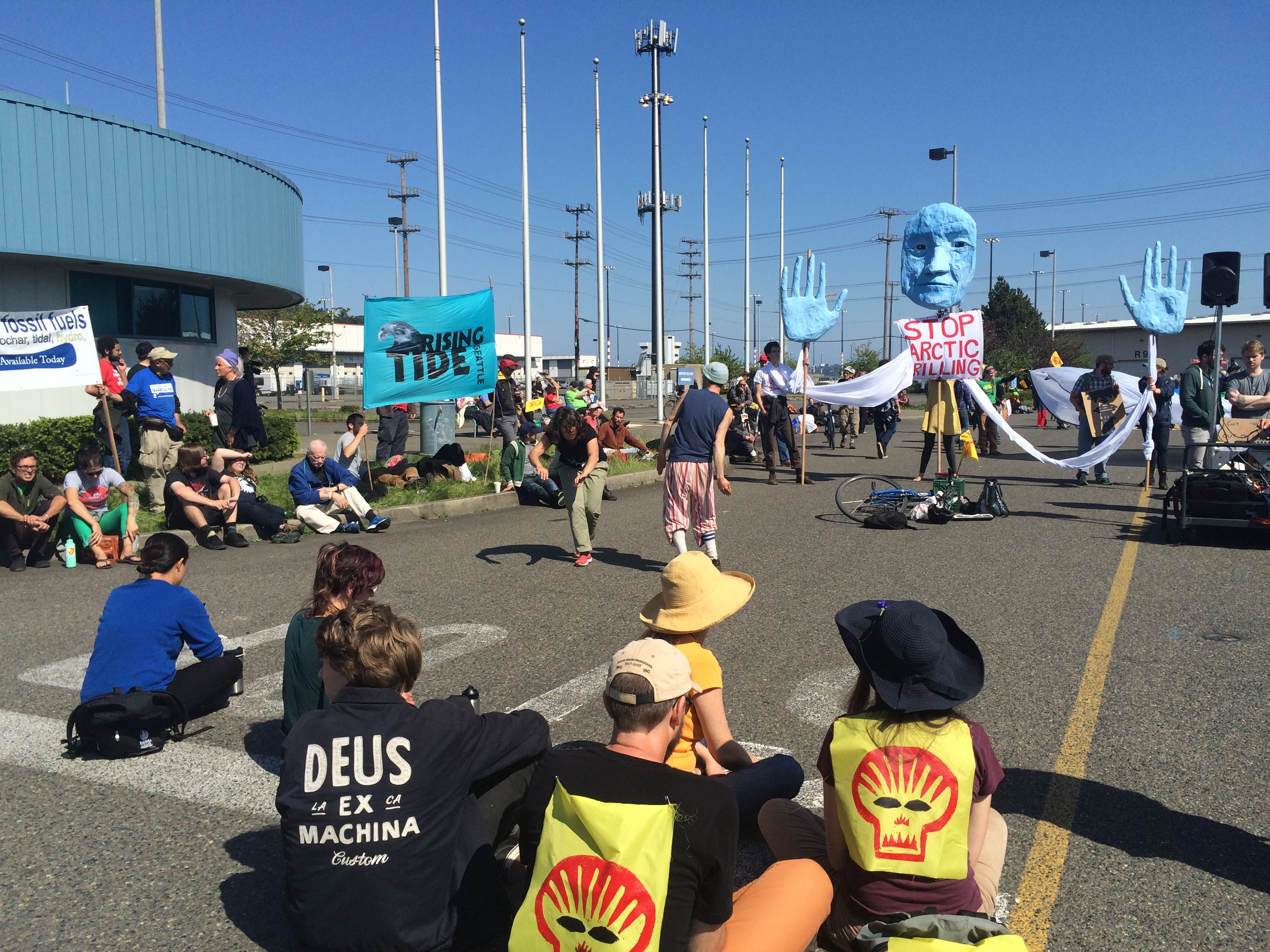For the second time in three days, Seattle is the vibrant center of the global climate movement. On Saturday, hundreds of “kayaktivists” took to the water to protest the recent arrival of a Shell oil drilling rig. On Monday, hundreds of activists blocked road traffic to the port where the rig is stationed, preventing the majority of port workers from getting to their jobs.
The immediate target of protest is Shell’s Polar Pioneer rig, which arrived in Puget Sound last Thursday. Shell intends to use Seattle as a staging ground for oil drilling operations in the Arctic. Activists are concerned about the high potential for spills and accidents in the remote, icy area off the Alaska coast, but they’re particularly outraged that Shell plans to drill for oil in the melting Arctic. Climate scientists have said Arctic oil must stay in the ground if we’re to prevent the worst of climate change. And they’re furious that Shell is bringing its dirty business to green Seattle.
The protesters began marching into the Port of Seattle before 7 a.m. on Monday. They successfully blocked traffic on the West Seattle bridge early in the morning and then created a blockade at the port’s Terminal 5, where the Polar Pioneer is parked. They were serious about their cause — but also serious about having some fun.
Rallying cries of “Shell No!” rang out across the terminal, activists displayed beautifully hand-painted banners and picket signs, local DJs started blasting some tunes and began a dance party, a flock of humans dressed as pelicans showed their moves, and two Alaskan natives performed traditional songs and told stories about their tribes’ ways of life. The terminal was flanked by Seattle police officers on bikes; both they and the protesters remained peaceful and no arrests were made.
The #ShellNo protests came together without any designated leadership, said Ahmed Gaya, an organizer for Rising Tide Seattle, an environmental activist organization.
“The fact that we turned about 500 people out at 7 a.m. … to come down and risk arrest from the Port, I mean that in and of itself is a tremendous show of strength. We said we were going to hold a festival of resistance at Terminal 5 and I think we’ve definitely made do [on that]. We’ve successfully blockaded the gates and created a festive environment that is open and welcoming. You see families here, kids here. We’ve made this very aggressive action accessible to a wide range of people and that’s been really beautiful,” Gaya said.
The people have spoken! @Shell, can you hear us? We aren't letting up anytime soon! #ShellNo #YouShellNotPass pic.twitter.com/N5LXlWmqn6
— Oil Change International (@PriceofOil) May 18, 2015
And indeed the protestors were a diverse group of people –university students, old-school activists, professionals in suits, and even a corgi or two.
“In my two and a half years of organizing in Seattle, I have never seen anything like this,” said Emily Johnston, an organizer with 350 Seattle. “Everybody has jumped in, everybody is passionate, everybody is pretty unified.”
Zoe Buckley Lennox, a Greenpeace activist who scaled and camped out on the Polar Pioneer drilling rig last month while it was en route to Seattle, was excited by the turnout. “It’s fulfilling that the story is going and people are still fighting this,” she said.
People who couldn’t attend in person tracked the #ShellNo action via social media. Two supporters from the East Coast even had pizzas delivered to the protesters, said Johnston.
George Pletnikoff, an Alaskan native from St. Paul Island in the Bering Sea, said the Seattle protests have been inspiring to him and the Unangan community in the Aleutian Islands. In Alaska, the climate movement is on the rise, he said, because people are seeing the impacts of global warming first-hand.
Seattle City Council member Kshama Sawant also attended the protest. Sawant, a staunch advocate of workers’ rights and economic justice, was elected to the Seattle City Council in 2013 running on a platform advocating raising Seattle’s minimum wage to $15 per hour. A version of her proposal passed last year and started going into effect at the start of this year. She has since broadened her scope and become a vocal anti-Shell advocate, as have many other city leaders.
“We’re here today because elected leadership at every level has failed … If you look globally, if you observe who are the worst hit with environmental devastation, you will see that it’s systematically low-income people, the poor, those who are politically marginalized. … There is no doubt that the movement for environmental sanity really is a movement for environmental justice,” said Sawant.
While activists who attended the event marked the protest as a victory, they all know that the fight has just begun. They hope to get the Polar Pioneer ejected from the Port of Seattle. Port commissioners approved Shell’s plan in January, but the mayor and the city council oppose it. Two weeks ago, Mayor Ed Murray declared that the Port of Seattle must reapply for a new permit to lease terminal space to Shell, which could delay the company’s Arctic drilling plans by weeks or months.
Meanwhile, activists will be cooking up more protests and direct actions, so expect Seattle to remain in the spotlight for a while.




